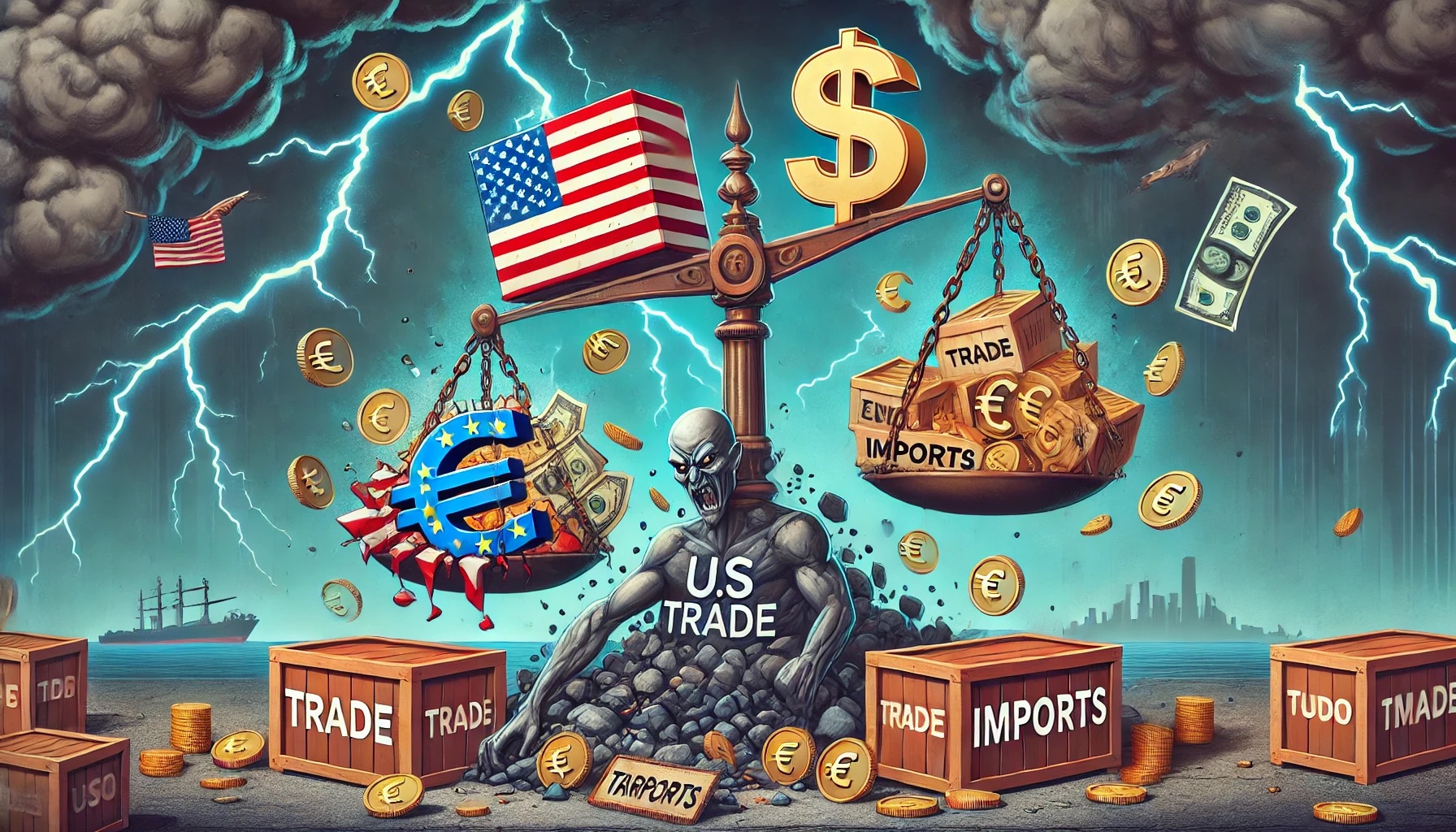The US imposition of a 10% tariff on Eurozone imports could shrink growth by as much as 0.43%, UBS economists report. The decline depends on Europe’s response, with retaliation increasing inflationary pressures while non-retaliation may curb price hikes but weaken growth further.
Tariffs Pose Significant Risk to Eurozone Growth
Economists at UBS predict that a 10% tariff on all EU imports might have a major effect on GDP growth.
This analysis models the proposed tariffs as part of a larger framework on global trade tensions, drawing attention to the fact that the economic impact of these measures will be greatly affected by the reaction of Europe and other countries around the world, Investing.com reports.
While complete retaliation would reduce the direct GDP impact of a 10% US tax on the Eurozone by 0.28 percentage points (pp), the absence of retaliation would result in a decrease of 0.43 pp, according to UBS. A decline in exports has a greater effect on GDP than a decline in imports.
According to analysts, “The nominal value of a 10% tariff on the Eurozone is worth about EUR30bn, or 0.2% GDP.”
Economic Fallout of Export Declines
It is projected that tariffs imposed solely to Europe will have a negative effect on GDP ranging from 28 basis points in the case of complete retaliation to 43 basis points in the absence of retaliation. This loss would be driven solely by a bigger drop in exports relative to imports.
The impact of these levies on inflation will depend on what Europe does. UBS estimates that retaliatory tariffs might lead to a 13 bp increase in consumer price inflation and a 26 bp increase in the GDP deflator.
As a result of less currency depreciation and lower import price adjustments, the consequences of inflation are mitigated in the absence of retaliation.
Inflation and Retaliation: Key Considerations
"We estimate the inflation impact between -2bp and +26bp for the GDP deflator and between 1 to 13bp for CPI," the authors said.
"If Europe does not retaliate and thus its import prices do not go up, the inflation impact is largely a function of the currency depreciation and growth weakness; by contrast, retaliation lifts import prices and inflation," they stated.
Things alter when you add in the broader escalation of tariffs in the US, like a 60% duty on Chinese goods. The UBS report notes that the European inflationary effects could be mitigated if the RMB depreciates compared to the USD and the EUR.
Domestic Demand Expected to Withstand Tariff Pressures
"If RMB depreciates more than other currencies due to higher US tariffs, imports from China could cheapen, neutralizing the inflationary impact of Europe's own tariffs," the note says.
According to UBS, the effects on domestic demand will be small, with coefficients of retaliation ranging from -0.01 to -0.13 pp.



 Australian Dollar Rallies on Hawkish RBA Outlook; Yen Slips as BOJ Faces Political Pressure
Australian Dollar Rallies on Hawkish RBA Outlook; Yen Slips as BOJ Faces Political Pressure  Argentina Tax Reform 2026: President Javier Milei Pushes Lower Taxes and Structural Changes
Argentina Tax Reform 2026: President Javier Milei Pushes Lower Taxes and Structural Changes  Gold Prices Steady in Asia, Set for Strong February Gains on Safe-Haven Demand
Gold Prices Steady in Asia, Set for Strong February Gains on Safe-Haven Demand  Asian Stocks Tumble as US-Iran Conflict Escalates and Oil Prices Surge
Asian Stocks Tumble as US-Iran Conflict Escalates and Oil Prices Surge  U.S. Stocks Close Lower as Hot PPI Data, Nvidia Slide Weigh on Wall Street
U.S. Stocks Close Lower as Hot PPI Data, Nvidia Slide Weigh on Wall Street  Japan Manufacturing PMI Jumps to Four-Year High as Global Demand Strengthens
Japan Manufacturing PMI Jumps to Four-Year High as Global Demand Strengthens  The strikes on Iran show why quitting oil is more important than ever
The strikes on Iran show why quitting oil is more important than ever  China’s New Home Prices Post Sharpest Drop Since 2022 Amid Ongoing Property Slump
China’s New Home Prices Post Sharpest Drop Since 2022 Amid Ongoing Property Slump  Dominican Republic Unveils Massive Rare Earth Deposits to Boost High-Tech and Energy Sectors
Dominican Republic Unveils Massive Rare Earth Deposits to Boost High-Tech and Energy Sectors  MOEX Russia Index Hits 3-Month High as Energy Stocks Lead Gains
MOEX Russia Index Hits 3-Month High as Energy Stocks Lead Gains  Gold Prices Surge Over 2% After U.S.-Israel Strikes on Iran Spark Safe-Haven Demand
Gold Prices Surge Over 2% After U.S.-Israel Strikes on Iran Spark Safe-Haven Demand  Australian Job Advertisements Hit 16-Month High as Labour Market Stays Resilient
Australian Job Advertisements Hit 16-Month High as Labour Market Stays Resilient  Global Markets Reel as Euro Falls, Swiss Franc Surges and Oil Prices Spike After U.S.-Israel Strike on Iran
Global Markets Reel as Euro Falls, Swiss Franc Surges and Oil Prices Spike After U.S.-Israel Strike on Iran  Australia Housing Market Hits Record High Despite RBA Rate Hike
Australia Housing Market Hits Record High Despite RBA Rate Hike  Venezuela Oil Exports to Reach $2 Billion Under U.S.-Led Supply Agreement
Venezuela Oil Exports to Reach $2 Billion Under U.S.-Led Supply Agreement  Trump Warns Iran as Gulf Conflict Disrupts Oil Markets and Global Trade
Trump Warns Iran as Gulf Conflict Disrupts Oil Markets and Global Trade 































